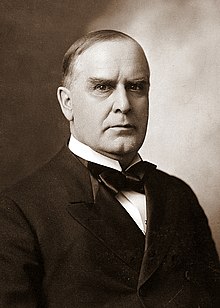Search This Blog
Sunday, April 15, 2012
William McKinley
Served as president from 1897-1901
Era: Foreign Policy, Progressive Era and WWI
American Identity and Culture
American popular culture flourished in terms of the press, amusements, and even sports. Mass circulation newspapers had been around for many years, but it soon began to exceed one million in circulation. Magazines also became increasingly popular and numerous in the 1880s and 1890s. Factors like a gradual reduction in working hours, improved transportation, promotional billboards and advertising, and the decline of strict puritanical values promoted the growth of leisure time activities. American spectator sports grew and became organized into teams and leagues. It would eventually become a commercial enterprise.
Economic Transformations and Globalization
McKinley’s administration attempted to form an international agreement where silver and gold would be acceptable backing for major European currencies. Unfortunately, this failed and McKinley supported a gold-based currency. He signed the Gold Standard Act in 1900 which officially placed American money on the gold standard. McKinley also hoped to reduce internal taxes and encourage the growth of industry and American worker employment by proposing to increase a tariff income. This resulted in the Dingley Tariff of 1897 which raised rates to an average rate of forty nine percent.
Environment
Due to the United States’ imperialist attitude during this time, the nation gained a lot of territories. However, with the increase in territories came the resource extraction and development that followed, as well as cultural and political domination. Americans tended to exploit its territories for their rich resources, especially because it was continuing to rapidly industrialize. Not only that, but Americans also took special interest in the affairs of the Western Hemisphere and justified its interference with the Monroe Doctrine.
Politics and Citizenship
William McKinley sought a middle ground to the issue of civil service. Cleveland’s civil service system based on merit angered Republicans in that it allowed Democrats to assume key positions within the government. McKinley was finally pressured into issuing an executive order which removed about four thousand positions. Civil service reformers saw McKinley as a puppet controlled by his managers. This included his friend Mark Hanna, who was recently elected as a U.S. senator from Ohio and McKinley’s longtime political supporter.
Slavery and its legacies in America
Another issue that occupied McKinley’s attention was race relations. Because he was unwilling to alienate white Southerners, William McKinley made little effort in addressing the issue of the exclusion of African Americans from politics. In his 1897 inaugural address, he condemned lynching. However, he failed to take any formal action against it. McKinley also failed to take action against anti-black violence in the South. The actions that he did take were superficial. Thirty African Americans were appointed to “positions of consequence” which were in diplomatic and records offices and fell short of the number that black Republicans wanted.
War and Diplomacy
McKinley was forced to go to war against Spain. Many Americans were angered by the way Spain crushed the Cuban revolt in 1895 and began to raise money and even fight on the side of the Cuban nationalists. On the other hand, American businesses had economic interests that they wanted to protect because they had made investments. After the sinking of the U.S. battleship Maine, McKinley issued Spain an ultimatum. Although Spain agreed to a ceasefire in Cuba, the American public clamored for war. McKinley gave into public pressure and sent a war message to Congress. It then authorized the war and issued the Teller Amendment, declaring that the United States had no intention of controlling Cuba and would give it control of its own government after peace was restored.
Subscribe to:
Post Comments (Atom)

No comments:
Post a Comment